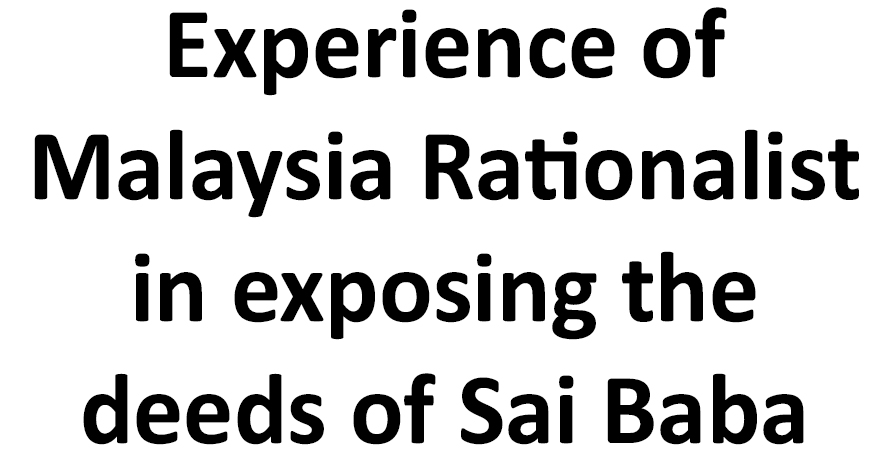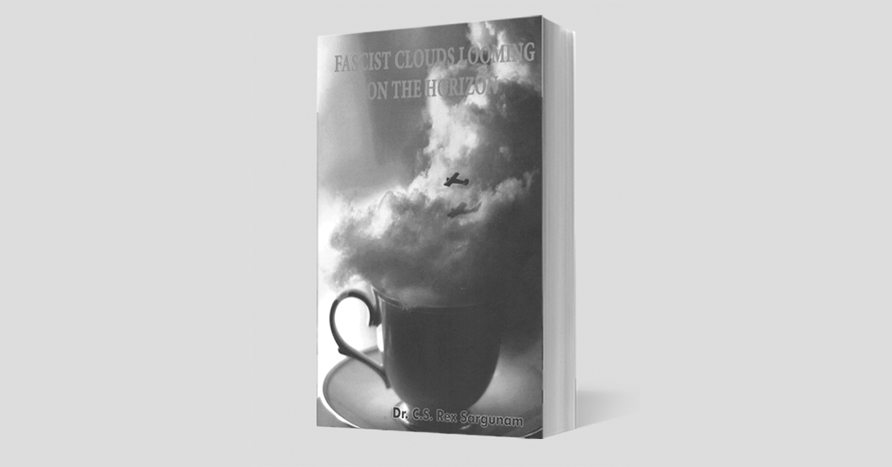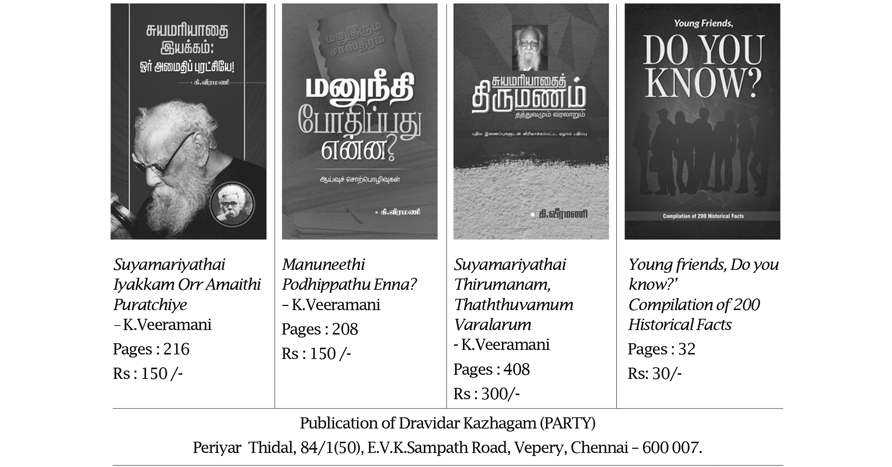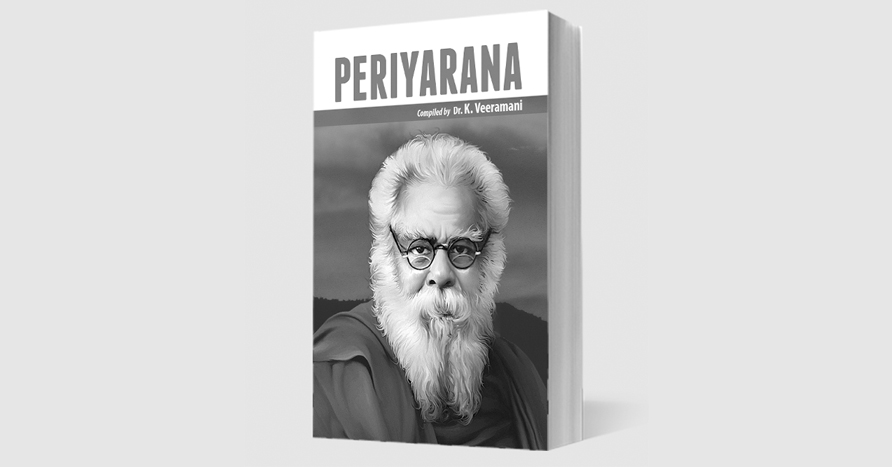The Modern Rationalist – Annual Number 2016,
Published by The Periyar Self-Respect Propaganda Institution
Pages : 224 Price : 120
Available at Periyar Book House, Periyar Thidal,
84/1(50),E.V.K. Sampath Road, Vepery, Chennai – 600 007.
Phone No. 044-2661 8163
E mail: themodernationlist@gmail.com
Website: www.dravidianbookhouse.com
The Annual Number of ‘The Modern Rationalist’ brought out to celebrate the 84th birthday of Asiriyar Dr.K.Veeramani makes absorbing reading with choice articles on the theme ‘Women Liberation and Empowerment’, by experts in different fields connected with the topic
It contains the translation of ‘Why were Women Enslaved’ by Periyar and his views expressed by him on topics connected with women, such as widowhood, birth control and family planning. One could find in them examples of Periyar’s analytical reasoning leading to unique conclusions. He expresses his agony on the plight of the widows when he says that ‘sati’ might have been preferable to widowhood which causes an entire life of misery. Speaking of birth control, he suggests delinking childbirth from sex and resorting to the production of test tube babies.
Mani Shankar Aiyar, former Minister of Panchayat Raj has given a detailed account of Rajiv Gandhi’s endeavour to introduce meaningful Panchayat Raj in India, ensuring women’s participation in local bodies through reservation, saying that experience bears out the success of this move. S.Ratnakumar, Tirukkural Scholar of Singapore goes into the systems which ensured women’s enslavement in our country and lists out Periyar’s attempts to liberate them.
Dr.Ramendra of Bihar goes into the heinous practice of female foeticide and holds that this could be stopped only by ensuring gender equality and by making a frontal attack on poverty. In his article, “Marriage, a Curse or Blessing?” S.Rajaratnam explores the way marriage can become a blessing, leading to happiness. Justice A.K.Rajan, writing on Periyar’s views on women empowerment, says that emancipation must come first in order to ensure empowerment.
The extract from Gopalkrishna Gandhi’s work gives us a glimpse into the life of world famous M.S.Subbulakshmi, a woman born in a devadasi family, who reached dizzy heights in music.
A.Vijayam of Atheist Centre, Vijayawada, taking a comprehensive look at the problem, feels that men’s liberation is urgently needed, without which women’s liberation is not possible. Dr.P.Kalimuthu lists out in detail all the Hindu traditions which worked against women and traces the attempts made by Self Respect Movement for their emancipation.
Dr.Ajay S.Sekher narrates the heart rending story of Nacheli the avarna women who showed her opposition of the barbaric practice of levying tax to the avarna women who covered their breasts followed in the erstwhile Travancore State. Nacheli cuts her breasts, bleeds to death and attains martyrdom.
Dr.Soma Ilangovan of Periyar International, USA laments the fact that even in the United States, the first woman judge of the USA supreme court had to prepare dinner, because she was a woman.
Dr.Shalini, the psychiatrist makes out that women’s enslavement was the plot hatched by the less endowed male, who would otherwise be left without a mate.
Dr.H.Parveen relates the success story of POWER (Periyar Organisation for Women Empowerment and Renaissance) founded by Dr.K.Veeramani with a view to empowering rural women. Dr.K.Sadasivan has made an indepth study of Devadasi System, its practice, its place in the society through, ages its degeneration into prostitution and how it was abolished through the efforts of the Self Respect Movement.
Dr.A.Karunanandan maintains that the surest way of ensuring women’s enslavement is to make it a religious injunction and goes into the scriptures of all religions showing all of them have uniformly carried out the task.
Dr.Palani Arangasamy traces the thoughts of feminism in the poems of Bharatidasan and shows he has furthered the cause through his poetic excellence. Prof.S.F.N.Chelliah has come out with an excellent narration of the success story of Narthagi Natarajan. Dr.K.Chellappan has recorded poet P.B.Shelley’s concept of women’s liberation by going through his poems. Dr.M.P.Sathyavel Murugan goes into anthropology and comes out how the matriarchal society of the Dravidians which allowed freedom of women was converted into patriarchal society by the Aryans who introduced total enslavement of women.
There is an article by Thenmozhi on the Mahashtrian activist Savitribai Phule, wife of the famous ‘Mahatma’ Jothiba Phule, and it shows Savitribai working independently and rendering yeomen service for empowerment of women. There is an interview of Asiriyar by Prof. S.F.N.Chelliah, covering a number of topics, political, social, philosophical as well as personal.
Making out a case for education being a ‘Vital Instrument of Women Empowerment’, Prof.
N. Ramachandran shows how the “aspiration of Periyar have been realised by the strenuous efforts of present chief of the educational institutions Dr. K. Veeramani.
Dr. Malliga enumerates the ways in which the girls studying in Periyar Centenary Polytechnic College have been emancipated and empowered by following the path shown by Periyar.
N. Ramachandran and Anand Jerald Sebastine give an elaborate sketch of “Periyar Pura, Horizon and Paradigm,” and how it look forward to bringing about rural transformation and the inevitable women empowerment. Prof. Anantharaman’s account of his association with the Asiriyar since his student days is a pleasant fusion of friendliness and admiration. There is a poignant letter by Dr H S Bhat who served as Periyar’s Physician in his last days.
The citations read out by Alagappa University, Karaikudi, and Tiruvalluvar Acadamic and Fine Arts Association, Sivagiri, while honouring Asiriyar with their award of degree and title respectively, bring out his merits. The letter written by the young girl Dorathy Zindagi of Sivagiri, however, takes the cake, depicting the adoration of a young girl for then great liberator.
Poet Kali Poongunran spells out how Periyar feminism is more radical than the other varieties. Dr. S. Pirai Nuthal Selvi and Dr. Gowthaman take up the topic of distancing the women in the society during menstruation and show how self contradictory the practice is. In his concluding article, V. Kumaresan brings out the greatness of Periyar citing various incidents and quoting various sources.
Two names have been repeatedly occurring in these articles. One is that of Manu, the so called law giver and the other is that of Periyar.The first one is decried for the disservice he did to humanity in general and Hinduism in particular, by invoking religion for subjugating women to the worst form of enslavement in the entire history of mankind.
Periyar on the other hand is mentioned as the liberator par excellence for having made a thorough analysis of all the factors, social and religious, that led to the enslavement of woman and far suggesting far reaching and revolutionary remedies.
In short this is a book to be ‘chewed and digested’, which could a treasurehouse for researchers and students of sociology and feminism and of course, Periyarism.
The Number has been graced by message from Justice P. Sathasivam, Governor of Kerala, Nitish Kumar, Chief Minister of Bihar, and V. Narayanasamy, Chief Minister of Pondicherry, Justice S. Mohan, Justice A.R.Lakshmanan and Justice V. Gopal Gowda, former Judges of the Supreme Court of India.
The well got up souvenir is, embellished with suitable photographs. – Leslie Amerson







